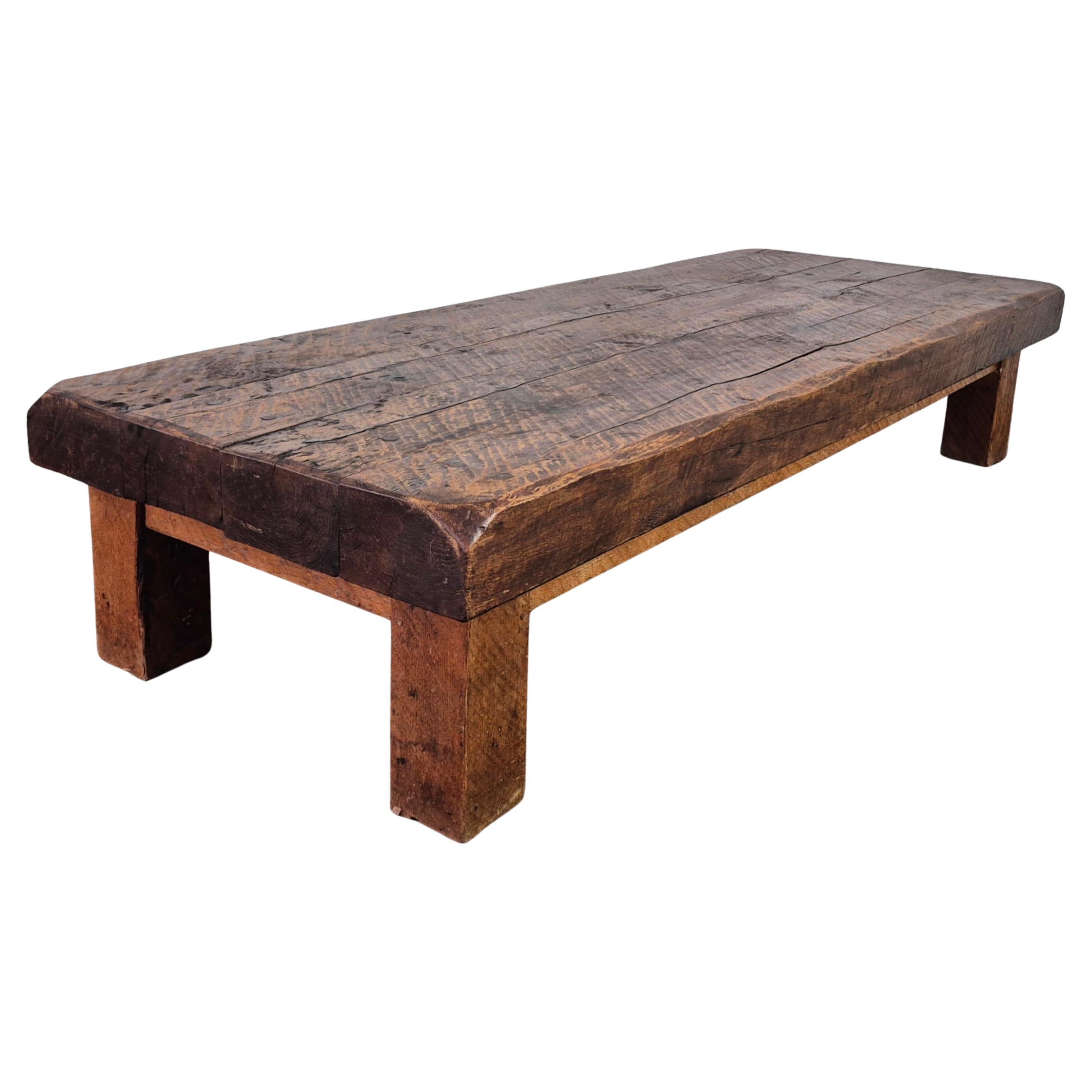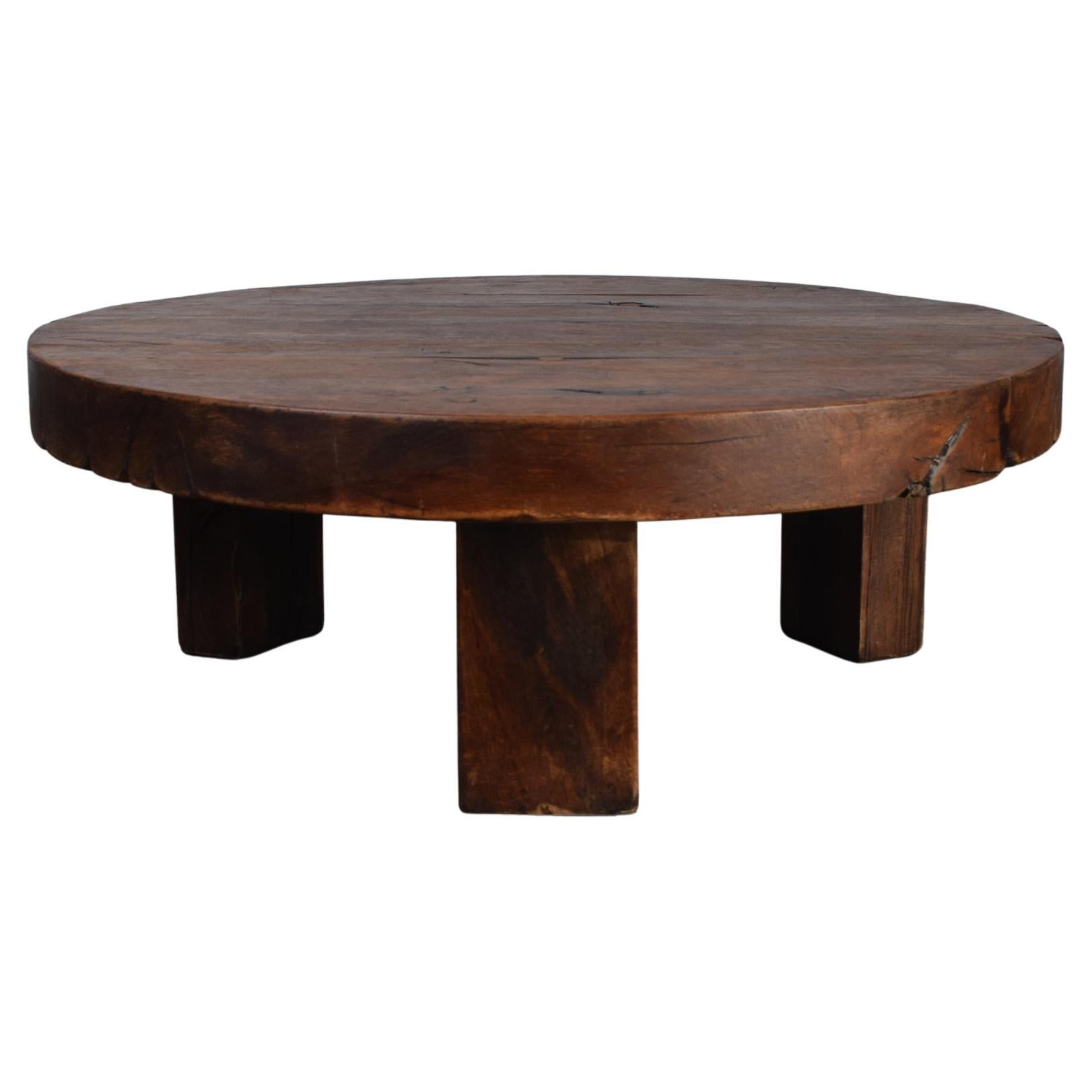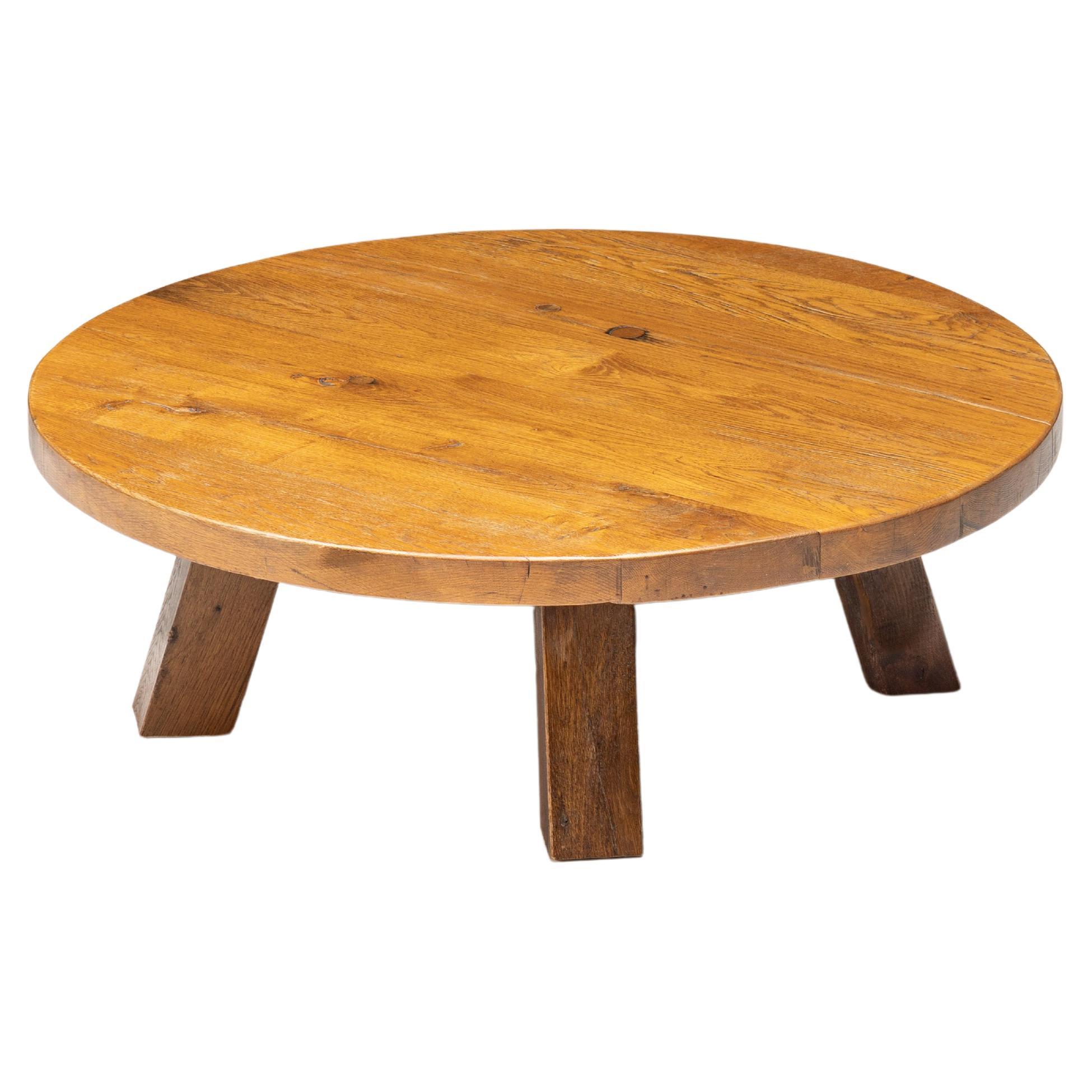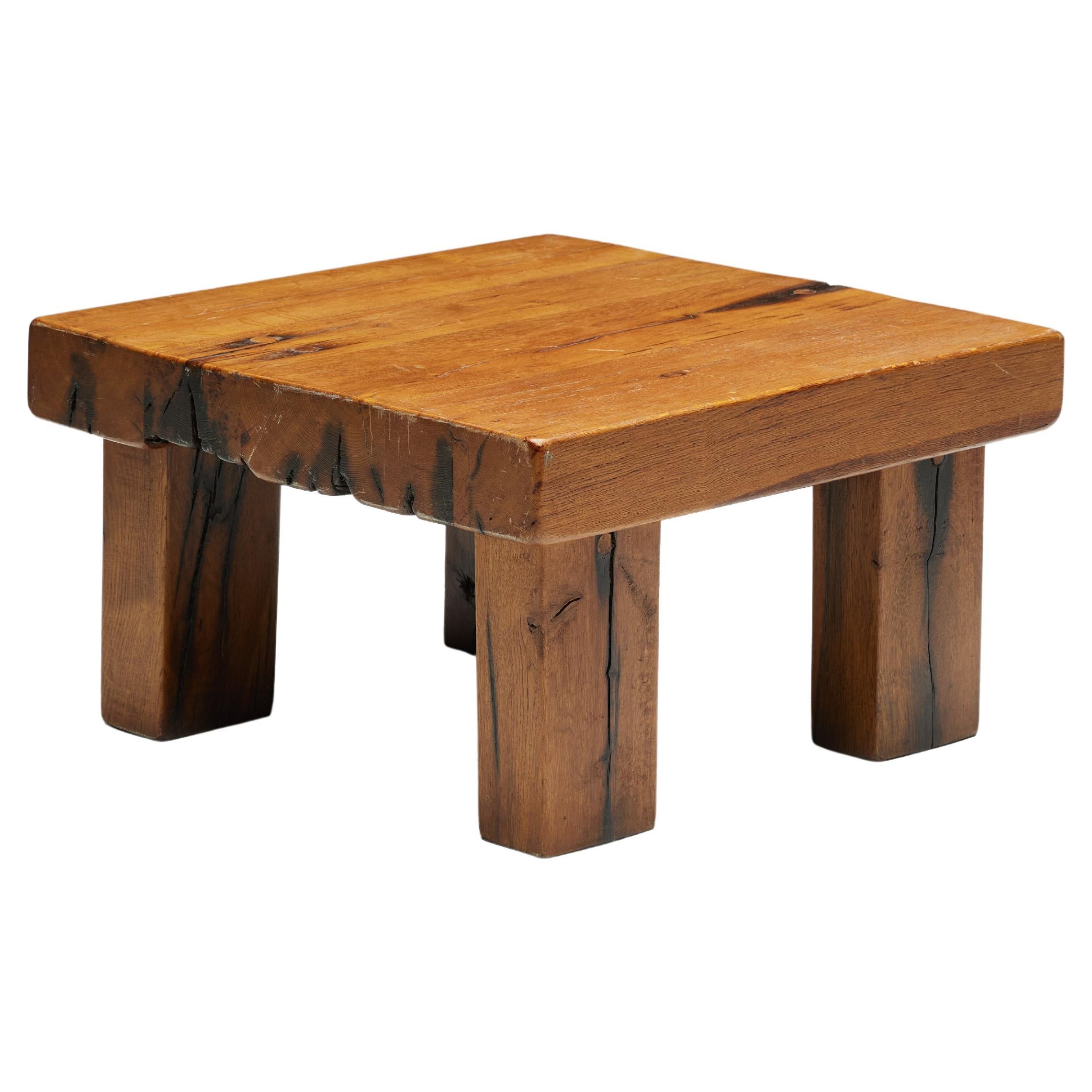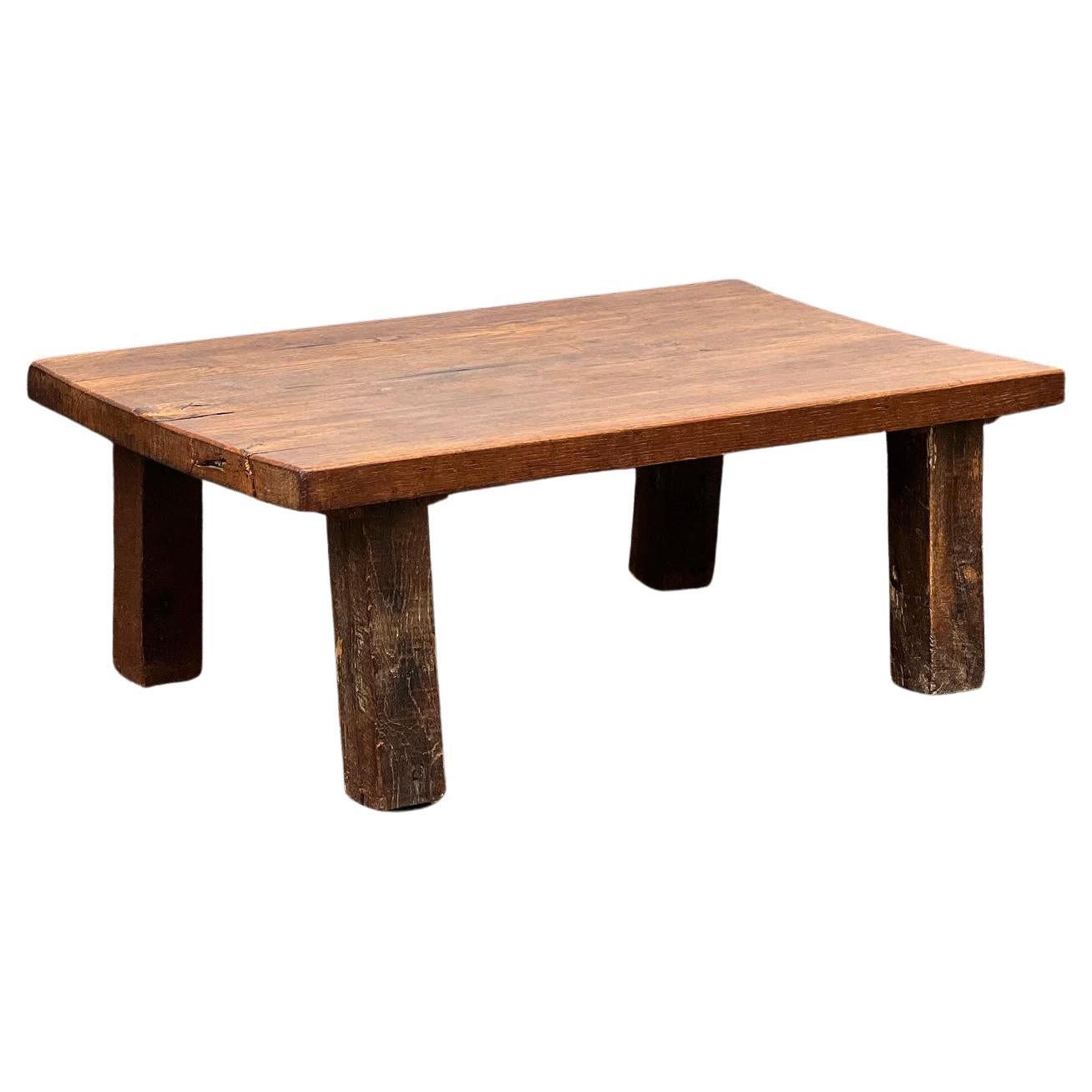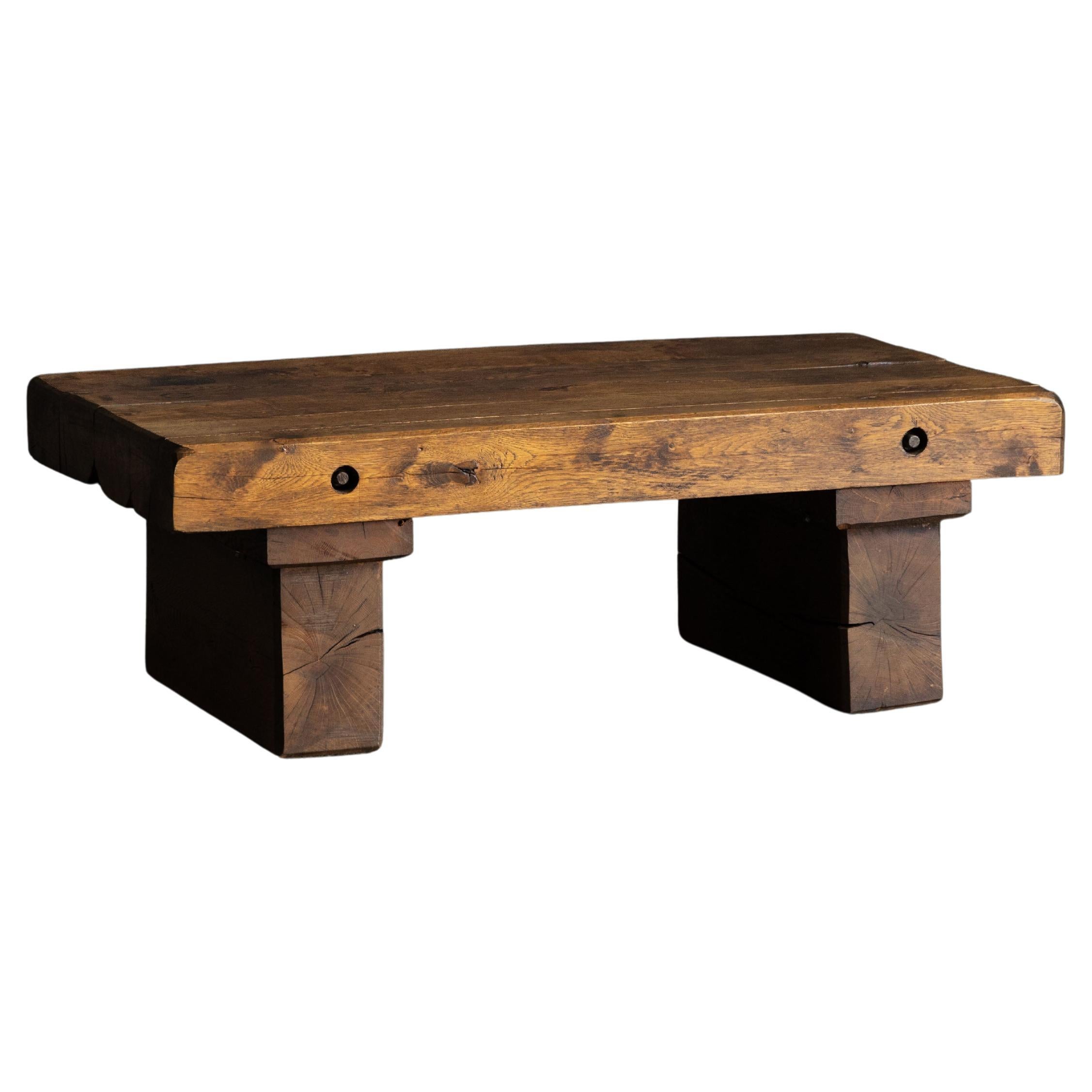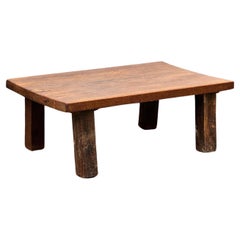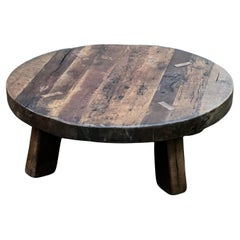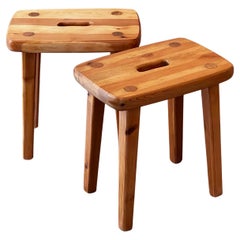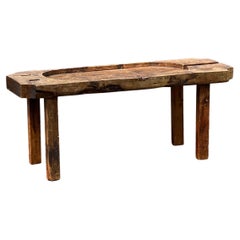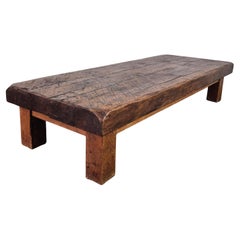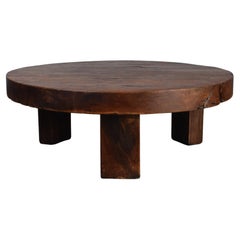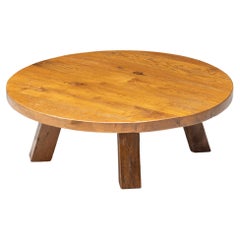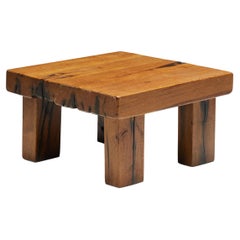Items Similar to French Brutalist Oak Coffee Table, Freeform, 1950s, Handmade
Want more images or videos?
Request additional images or videos from the seller
1 of 6
French Brutalist Oak Coffee Table, Freeform, 1950s, Handmade
About the Item
Very unique oak handmade massive slay of tree. It is a free form shape. The top is patinated and shows various shades of brown/brownish colors and honey tones. Elegant and brutalist describe that table properly. The height is 31.5 cm and is 86 cm x 66 cm. Very strong table. Lovely as a side table, a coffee table or a stand for a sculpture.
--------------------------------------------------------------------------------------------------------------------
Brutalist architecture is an architectural style that emerged during the 1950s in the United Kingdom, among the reconstruction projects of the post-war era. Brutalist buildings are characterised by minimalist constructions that showcase the bare building materials and structural elements over decorative design. The style commonly makes use of exposed, unpainted concrete or brick, angular geometric shapes and a predominantly monochrome colour palette; other materials, such as steel, timber, and glass, are also featured.
Descending from the modernist movement, brutalism is said to be a reaction against the nostalgia of architecture in the 1940s. Derived from the Swedish phrase nybrutalism, the term "new brutalism" was first used by British architects Alison and Peter Smithson for their pioneering approach to design. The style was further popularised in a 1955 essay by architectural critic Reyner Banham, who also associated the movement with the French phrases béton brut ("raw concrete") and art brut ("raw art"). The style, as developed by architects such as the Smithsons, Hungarian-born Erno Goldfinger, and the British firm Chamberlin, Powell & Bon, was partly foreshadowed by the modernist work of other architects such as French-Swiss Le Corbusier, Estonian-American Louis Kahn, German-American Mies van der Rohe, and Finnish Alvar Aalto.
In the United Kingdom, brutalism was featured in the design of utilitarian, low-cost social housing influenced by socialist principles and soon spread to other regions around the world. Brutalist designs became most commonly used in the design of institutional buildings, such as universities, libraries, courts, and city halls. The popularity of the movement began to decline in the late 1970s, with some associating the style with urban decay and totalitarianism.
Brutalism has been polarising historically; specific buildings, as well as the movement as a whole, have drawn a range of criticism (often being described as "cold" or "soulless") but have also elicited support from architects and local communities (with many brutalist buildings having become cultural icons, sometimes obtaining listed status). In recent decades, the movement has become a subject of renewed interest. In 2006, several Bostonian architects called for a rebranding of the style to "heroic architecture" to distance it from the negative connotations of the term "brutalism".
- Similar to:José Zanine Caldas (Artist)
- Dimensions:Height: 12.41 in (31.5 cm)Width: 32.29 in (82 cm)Depth: 25.99 in (66 cm)
- Style:Brutalist (In the Style Of)
- Materials and Techniques:
- Place of Origin:
- Period:
- Date of Manufacture:1950's
- Condition:Wear consistent with age and use. Minor fading.
- Seller Location:Forest, BE
- Reference Number:1stDibs: LU8186234550182
About the Seller
5.0
Gold Seller
Premium sellers maintaining a 4.3+ rating and 24-hour response times
Established in 2007
1stDibs seller since 2023
30 sales on 1stDibs
Typical response time: <1 hour
- ShippingRetrieving quote...Shipping from: Forest, Belgium
- Return Policy
Authenticity Guarantee
In the unlikely event there’s an issue with an item’s authenticity, contact us within 1 year for a full refund. DetailsMoney-Back Guarantee
If your item is not as described, is damaged in transit, or does not arrive, contact us within 7 days for a full refund. Details24-Hour Cancellation
You have a 24-hour grace period in which to reconsider your purchase, with no questions asked.Vetted Professional Sellers
Our world-class sellers must adhere to strict standards for service and quality, maintaining the integrity of our listings.Price-Match Guarantee
If you find that a seller listed the same item for a lower price elsewhere, we’ll match it.Trusted Global Delivery
Our best-in-class carrier network provides specialized shipping options worldwide, including custom delivery.More From This Seller
View AllFrench Brutalist Oak Coffee Table, in the style of Pierre Chapo, 1950s, Handmade
By Pierre Chapo
Located in Forest, BE
Very unique oak handmade massive slays of tree. The top is patinated and shows various shades of brown/brownish colors and honey tones. Elegant and brutalist describe that table properly. The height is 31.5 cm and is 86 cm x 66 cm. Very strong table. Lovely coffee table.
--------------------------------------------------------------------------------------------------------------------
Pierre Chapo est né dans le 19e arrondissement de Paris, mais en 1937 la famille s'installe à Vierzon, dans le Cher, le jeune homme s'essaie à la peinture. Puis rencontre en 1947 un charpentier de marine; dans son atelier il découvre le travail du bois, et décide de s'inscrire à l'École nationale supérieure des beaux-arts, section architecture avec Henri Larrieu et Louis Aublet. Les études sont entrecoupées de voyages vers les pays scandinaves, du service militaire en Allemagne, ainsi que d'un périple d'un an en Amérique centrale et un stage dans un cabinet d'architectes en Arizona.
De retour en France, Pierre Chapo poursuit le travail du bois essentiellement le chêne, le frêne et l'orme massif qu'il articule avec le double intérêt qu'il porte au design contemporain et au savoir-faire de l'artisanat traditionnel. Après quelques années, il ouvre une galerie boulevard de l'Hôpital, où il expose ses réalisations ainsi que celles d'autres créateurs comme Isamu Noguchi avec lequel il partage une approche sculpturale et organique, il reçoit ses premières commandes parmi lesquelles un lit simple demandé par Samuel Beckett. En 1960, lors de l'exposition Arts et techniques de l'artisanat, son travail est reconnu par la ville de Paris dont il reçoit la Médaille d'or.
Puis c'est le développement de l'atelier de fabrication de meubles, à Clamart et la participation à plusieurs projets avec des fabricants et des aménagements avec différents architectes-maitres d’œuvre dont le travail de certains comme Charlotte Perriand pour la station des Arcs l’influencera6 et dont il éditera plus tard une table basse. En 1967, il expose au Salon des artistes décorateurs et remporte la Médaille de bronze de la Société d'encouragement à l'art et à l'industrie9. Cette même année, il s'installe à Gordes et y crée sa société et son usine qui vend et fabrique les meubles audacieux et robustes, en bois massif qu'il dessine, tout en conservant l'atelier de Clamart et la boutique de Paris, étendant son réseau avec des dépositaires à Bruxelles et dans plusieurs villes de France...
Category
Mid-20th Century French Brutalist Coffee and Cocktail Tables
Materials
Hardwood
$808 Sale Price
65% Off
Large French brutalist massive oak coffee table 130cm
Located in Forest, BE
This is a large and massive coffee table made out of railroad beams. Made in France around the 1950's. It's so strong that it will last forever. M...
Category
Vintage 1950s French Brutalist Coffee and Cocktail Tables
Materials
Oak
$2,443 Sale Price
50% Off
Pair Swedish Brutalist pine stools, 1950s, Handmade fine quality refinished
By José Zanine Caldas, Axel Einar Hjorth
Located in Forest, BE
Handmade Swedish stools with massive slays of pine. It is a rectangular shaped with rounded edges. The joinery is really elegant. They were refinished and shows various shades of ho...
Category
Vintage 1950s Swedish Brutalist Stools
Materials
Hardwood, Pine
French Folk Art Cheese Making Massive Wooden Table, 1900
Located in Forest, BE
French Folk Art cheese making massive wooden table. Hand carved by a peasant, circa 1900. Some traces of use. Different shades of brown with a fan...
Category
Early 20th Century French Folk Art Coffee and Cocktail Tables
Materials
Hardwood
$1,047 Sale Price
40% Off
Unique Sodalite coffee table with brass frame in the taste of Ado Chale 1970's
By Maison Jansen, Armand Jonckers, Ado Chale
Located in Forest, BE
This is one of a kind sodalite stone table! The top is made out of stones with a brass frame to sublimely the top. The base is made out of black painted steel in a typical 1970's vib...
Category
Vintage 1970s Belgian Hollywood Regency Coffee and Cocktail Tables
Materials
Multi-gemstone
139cm Swedish folks fishnets knitting tools from 1793 Handmade Unique rare
By Axel Vervoordt
Located in Forest, BE
This is a set of 3 different but similar wooden structures/tools to build fishnets. Used by folks in the countryside of Sweden. The smaller one is engraved 1793, the others are unmar...
Category
Antique 1790s Swedish Folk Art Coffee and Cocktail Tables
Materials
Hardwood
You May Also Like
Large solid oak brutalist coffee table, France 1950s
By Pierre Chapo, Charlotte Perriand, Axel Vervoordt
Located in ECHT, NL
Large railway sleeper coffee table. The top is made from thick oak beams. It stands on a solid oak base.
The top has loads of patina and natural imperfections. The wood has a deep an...
Category
Mid-20th Century French Brutalist Coffee and Cocktail Tables
Materials
Oak
Exceptional Round Brutalist Oak Coffee Table 1950s
By Pierre Chapo
Located in ECHT, NL
This Exceptional oak brutalist mid-century coffee table embodies timeless design and robust craftsmanship. Its thick, round tabletop (8cm) showcases the natural beauty of solid oak, ...
Category
Vintage 1950s French Brutalist Coffee and Cocktail Tables
Materials
Oak
Round Brutalist Coffee Table, France, 1950s
Located in Antwerp, BE
Brutalist round wooden coffee table with a four-legged base, made of solid wood with a charismatic patina. Its surface provides ample space for showcasing your favourite books, treas...
Category
Vintage 1950s French Brutalist Coffee and Cocktail Tables
Materials
Wood
Brutalist Square Coffee Table, France, 1950s
Located in Antwerp, BE
Rustic square brutalist coffee table with a four-legged base, crafted from solid wood with an inviting patina. The square surface offers space for objects like books, magazines, and ...
Category
Vintage 1950s French Brutalist Coffee and Cocktail Tables
Materials
Wood
Brutalist Wabi Sabi Coffee Table, France, 1950s
Located in Antwerp, BE
This rustic brutalist coffee table captures the raw beauty of minimalist design with its bold, two-legged base and solid wood construction. The rectangular surface offers generous sp...
Category
Vintage 1950s French Brutalist Coffee and Cocktail Tables
Materials
Wood
Brutalist tripod coffee table in pine, France 1950s
Located in STRASBOURG, FR
Beautiful Brutalist coffee table made from a large piece of solid stained pine bearing an old marking and a notch, nested on three legs carved from thick conifer branches. Beautiful ...
Category
Vintage 1950s French Brutalist Coffee and Cocktail Tables
Materials
Pine
